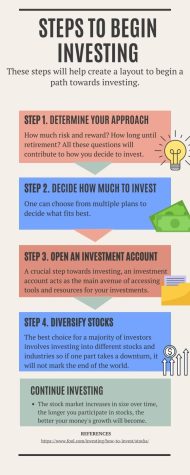Your donation will support the student journalists of North Cobb High School. Your contribution will allow us to purchase equipment and cover our annual website hosting costs.
Time to take stock
December 14, 2021
A major part of adult life tackles personal finance. Taxes, bills, retirement plans, all of these components create modern-day obstacles adults must face. The stock market endures as one of the most daunting parts of adult concerns, a game where money appears and disappears over simple Twitter posts. According to a survey by Junior Achievement USA, 97% of teens say they only know “some” or “not much at all” about the stock market, and 37% would outright avoid investing. The Federal Reserve states that only about 14% of American households own individual stocks while 52% own investment through other means, primarily 401(k) plans that employers typically sponsor. People can overlook investing because of its existing challenges and dangers, but a firm grasp on the types of investments available and the advantages and disadvantages of each can help educate teenagers who will one day need to decide on their financial futures.
“I think investing is very important in your adult life, a lot of people want to go to college and are gonna be doctors, lawyers, engineers which is great, but you’ll have a lot of debt. So investing will be a backup plan to economically support yourself later on in life, in your 60s, 70s, and 80s,” senior Jordan Karim said.
Personal finance includes multiple types of investing: stocks, bonds, mutual funds, index funds, exchange-traded funds (ETFs), and options. These specific items serve to grow one’s money, not to keep it safe. These multiple investment types with different levels of risk and return pressure one to wonder how to start placing money in something different from a bank account. What kind of investment should I look into? How much risk am I willing to take on financially? Where does my money go, and when can I get it back? All these questions and uncertainties nag at newcomers’ minds, and high schoolers will face these challenges themselves as soon as they hang up their diplomas.
The stock market, the promised land where chump change becomes rivers of gold. The main source and avenue of investments, stock trading means buying and selling shares of ownership in a company. When one buys a stock, that person buys into the financial risks and rewards of an individual company, also becoming a shareholder who may vote on company affairs. Investing in stocks requires extensive management on the investor’s end. A high risk, high reward venture, lacking extensive knowledge in stock will pose a great risk to money put into that stock.
“I held tech stocks like CISCO since I was in the industry and I knew they were growing. Networking switches and wifi routers, all that, the growth at the time shot up. That’s why I invested in them, I knew about the industry,” marketing teacher Richard Dennard said.
While individual stocks offer a possibility of snowballing potential growth over time, they also present the highest amount of risk. From the performance of a company to public opinion, anything that happens to or in a company can augment or hamper its future success. However, sticking with a company rather than pulling stock investments out as soon as the scent of danger wafts one’s way can still lead to success. A recent example of this occurred in July when Christiano Ronaldo put aside two Coca-Cola bottles during a press conference in favor of drinking water. Numerous publications and media outlets claimed that this action caused Coca-Cola to lose $4 billion in stock. It turns out that the company’s valuation arrived at that loss minutes before Ronaldo’s infamous maneuver and rebounded soon after. This type of misinformation can lead to investors needlessly pulling out of companies before a resolution can occur.
According to historical trends, the stock market increases its overall returns by 10% annually, which means that a 10% profit can occur yearly with relative confidence. Similarly, data across the last century of the stock market highlights overall growth as a common trend over time, with economic downturns leaving only impermanent marks.
“I think that when students graduate, they should start investing as soon as they legally can, which is 18. It’s amazing that you put a little money away at 18 and just a little bit as they go until they’re 62 or retiring, it’s amazing how much money you’ll have and they’ll be able to enjoy retirement and have resources to not worry about finances so to speak, so it’s playing the long game,” world history teacher Jeffrey Bettis said.
Bonds function as loans given to either the government or a company by investors and can change in value over time. The investor makes money through interest and the borrower utilizes the money to continue operations. Bonds work by paying a “coupon rate” back to the investor. For example, a $5,000 bond with a ten-year maturity date and a coupon rate of 5% would provide the investor with $250 annually for 10 years. After that timeframe, the borrower will also repay the original value of the bond.
Advantages of bonds include greater safety than stocks and the ability to act as fixed-rate income to benefit retirees or other individuals looking for regular income. Disadvantages include low-interest rates and risk based on the borrower’s ability to repay. Another downside works opposite to how bonds benefit retirees; receiving the same income over time can decrease an investor’s purchasing power as inflation devalues a bond.
A third investment type, mutual funds, entails pooling investors’ funds together to purchase a variety of assets. Mutual funds look to diversify investor portfolios, and professional fund managers keep track of the investments for investors. Index funds and exchange-traded funds fall under mutual funds. Index funds consist of stocks or bonds listed on a particular index, or stocks and bonds bought and sold together. ETFs act similarly to index funds: they observe a benchmark index and look to mirror the index’s performance. The way these investments differ lies in an ETF updating and trading constantly on an exchange similar to an individual stock while mutual funds and index funds receive valuation once at the end of each trading day. This difference matters little to investors but ETFs provide greater control over a fund’s price.
Options, or a contract granting rights to buy or sell a stock at a certain price by a set date, offer a fourth and flexible investment choice. Options do not obligate one to actually buy or sell stock shares, rather one buys the contract to do so with an expiration date. After buying an option, one can buy or sell the shares before the expiration date as per the contract, sell the contract to another investor, or let the option expire and move on without further financial obligation. If the contract expires, the initial premium paid to buy the option will not return to the investor.
Advantages of options include taking control of large volumes of stock shares, providing investors with time to observe the market, and protecting the investor from risk by locking in an initial premium without obligation to buy or sell stocks. On the other hand, options can lose one’s entire investment quickly, options can become considerably more complicated than buying stocks, and certain types of options will end in losing money beyond the initial investment.
“Starting out, check out whatever company you’re working for and most will have a 401k. Stick with the index funds, including Vanguards and Fidelitys. Later in life, you might want to have a mixture of bonds, which are very stable generally but you want growth while you’re young so you want to go full stock, make sure you pick up index funds that got a good mixture of different industries. Stay with them until your mid-late 50s then start adding to the mixture with bonds,” Dennard said.

All of these types of investments tie in directly with the health of the stock market, and a majority branch off directly from pure stock trading. Investing offers multiple unique possibilities to begin growing money, but one must first decide on a direction to take when investing, decide how much money to invest, and open an investment account. These steps will open investment opportunities and reduce repercussions if an investment tanks.
After high school ends and adult life begins, money and the management of it will challenge young people with a variety of problems previously unthought of. Independence will shake up life with requirements to pay off next month’s bills, save enough money for a new car, or finance major life changes. Investing can improve lives, and knowing how to manipulate money will save people from plenty of headaches in the future.
